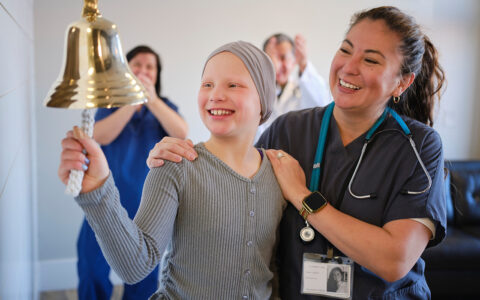In the post-George Floyd era, calls for reduction and the ultimate elimination of America’s huge health care disparities have grown more urgent.
Increasingly, medical leaders have rallied behind an approach called trauma-informed care as well-grounded in evidence, humane, and respectful of all stakeholders, in contrast to cultural competency, an older approach.
“Cultural competency skills were supposed to help providers deal with ways ‘other’ cultures respond to illness – the underlying assumption that being white, or from the dominant culture, was the norm,” said Uchenna E. Anani, M.D., a neonatologist at Monroe Carell Jr. Children’s Hospital at Vanderbilt.
“There’s little evidence showing that cultural competency initiatives have improved health outcomes for marginalized groups.”
“Cultural competency rests on assumptions a provider may have about other people. Rather than reducing bias, it introduces biased assumptions and reinforces stereotypes.
“Also, there’s little evidence showing that cultural competency initiatives have improved health outcomes for marginalized groups or have reduced disparities.”
Trauma is a Group Experience
Trauma-informed care embraces curiosity about the experience of another without making assumptions about their experience, identity, or culture, Anani said.
In this context, the term trauma refers to a personal experience of violence, abuse, or disaster, as well as collective traumas, such as experiences of institutionalized oppression and structural racism. These “events, experiences or environments that overwhelm a person’s coping mechanisms or compromise their ability to develop coping mechanisms,” Anani said.
Emphasizing Humility
Trauma-informed care teaches providers not to impose preconceptions on another person.
“It encourages health care providers to really listen to a patient’s particular story and educate themselves about the effects systemic oppression has had on individuals and groups,” Anani said.
This is a sign of “cultural humility,” she added, explaining that’s the ability to reflect on one’s own background and privilege to fully engage and learn with patients, an often-unrecognized aspect of trauma-informed care.
The approach applies not only to patient interactions, but also to peer and mentor-trainee relationships. “It can support diverse students and trainees and address disparities in the medical workforce,” she said.
Epigenetic Effects
The CDC has estimated that about 61 percent of the United States population has had at least one adverse childhood trauma experience, not including historical or collective trauma. In addition to physical or emotional abuse and sexual trauma, these events may include living with a drug-addicted sibling or a parent with severe mental illness, or being the close relative of someone who is incarcerated.
“It’s vital to grasp that trauma can be experienced not only by individuals but also by groups, as collective trauma.”
“But it’s vital to grasp that trauma can be experienced not only by individuals but also by groups, as collective trauma,” Anani said. Thanks to the body’s epigenetic mechanisms, group traumas can degrade the health of several generations.
These mechanisms include genomic imprinting, side-effects of cumulative stress, and weathering, a hypothesis recently confirmed in studies showing that racism and other types of high-level stress can have negative health impacts on the body’s physiology. These biological changes, in turn, may be passed on to children and grandchildren as the intergenerational effects of trauma, Anani explained.
A NICU Example
As a neonatologist and bioethicist, Anani focuses on families with infants in Monroe Carell’s neonatal intensive care unit (NICU).
A recent article she co-authored contrasts trauma informed care with a cultural competency approach, using a hypothetical case of a young Black mother and her 4-week-old premature infant in the NICU.
In the case, a medical student is observing when the neonatologist tells the mother her supply of pumped breastmilk is running low. The neonatologist responds by suggesting she see a lactation assistant, then adds: “ Meanwhile, we’ll order formula for backup.”
The mother admits she is having difficulty with her milk supply. Then adds, “I think he’ll get formula when he’s home, anyway. So, sure.”
The medical student, who knows breastfeeding rates are lower after hospital discharge among Black mothers, asks the neonatologist how to advise the mother about the advantages of continued breastfeeding. The neonatologist recommends giving the mother a breastfeeding brochure or handout and moves ahead with ordering formula.
Anani noted that the example illustrates how cultural competency may unintentionally reinforce racial disparities. In this case, the problem was a failure to thoroughly explore the patient’s issues with breastfeeding or offer additional support, potentially due to the assumption that as a Black mom, she would not persist in breastfeeding.
Merely offering her a booklet gave no opportunity to discuss any structural barriers this new mom may be facing.
“If someone had asked, she could have explained that she lacks an effective breast pump and the flexibility to pump at work,” Anani said. “She might have welcomed some peer support for breastfeeding.”
Listening and Engaging
“A cultural competency approach only looks at the surface, recognizing a known disparity, but a trauma-informed approach supports parental engagement, without re-traumatizing or shaming the mother, to better understand her narrative and support her – whatever her feeding goals may be,” Anani said.
With health care facing many crucial challenges, widespread adoption of trauma-informed care won’t happen overnight.
“A cultural competency approach only looks at the surface, recognizing a known disparity.”
“But something being hard is not a reason not to do it. Were that the case, no one would become a physician, social worker, or bedside nurse,” Anani said.
“We need to stay focused on our patients and the quality of care we deliver. By adopting a trauma-informed care lens for bedside care and hospital systems and policies, we’ll continue building on our culture of humility, compassion, and quality, while potentially addressing some health care disparities and inequities our patients face.”






